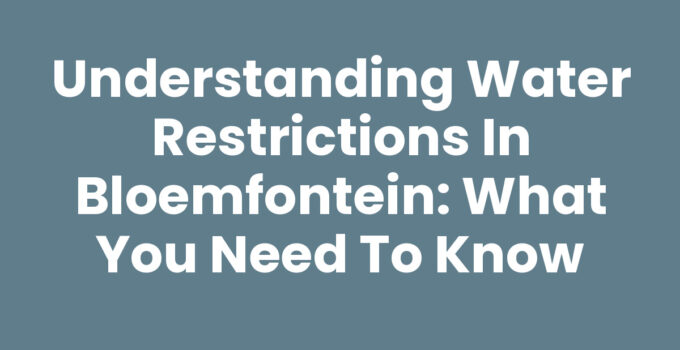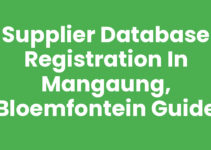Water scarcity has become an urgent issue across South Africa, particularly in cities like Bloemfontein. Over the past few years, residents have faced escalating water restrictions that aim to conserve this vital resource amid ongoing droughts. In this post, we will explore the current state of water restrictions in Bloemfontein, how they affect daily life, and what steps you can take to contribute to water conservation.
Water Restrictions Bloemfontein: A Comprehensive Overview
Water restrictions in Bloemfontein have been implemented to manage the city’s limited water supply effectively. These restrictions can range from the limitation of water usage for gardening to total bans on water consumption for non-essential services. Understanding the rationale and specifics of these restrictions is crucial for residents.
The Current Situation
As of now, water restrictions in Bloemfontein are categorized into different levels based on the severity of the water crisis:
- Level 1: Mild restrictions, focusing on minimizing waste. Residents are often advised to limit watering their gardens or using decorative fountains.
- Level 2: Moderate restrictions, which could include temporary bans on car washing and filling up swimming pools.
- Level 3: Severe restrictions, where water is only available for essential uses such as cooking, drinking, and sanitation.
The local municipality regularly reviews water levels and may escalate or relax restrictions based on rainfall and water usage trends.
Impacts on Daily Life
The implementation of stringent water restrictions has noticeable impacts on daily living. Residents experience changes in household routines, particularly regarding:
- Gardening: Many homeowners can no longer water their gardens as freely as before, leading to wilting plants and green spaces changing dramatically.
- Home Maintenance: Activities like washing cars and filling pools may become a rare luxury.
- Community Awareness: The awareness of water usage has increased in the community, leading to more conversations around conservation.
Ultimately, the effort to curb water consumption fosters a greater collective responsibility toward conservation.
See Also: Explore Top Services at Kliniek, Bloemfontein for Your Health
How Residents Can Help: Tips for Water Conservation
While the municipality is responsible for implementing and enforcing restrictions, every resident can contribute positively to water conservation. Here are some actionable strategies:
- Rainwater Harvesting: Invest in rain barrels to collect and store rainwater for future use. This proactive step allows homeowners to water gardens or flush toilets without using municipal water.
- Water-Saving Fixtures: Install low-flow showerheads and faucets. You’ll be surprised at how much water you can save with these simple adjustments.
- Mindful Usage: Be aware of your daily water usage. Limit showers to 5 minutes, turn off the tap while brushing teeth, and only wash full loads of laundry.
- Native Plants: Replace traditional landscaping with drought-resistant native plants that require far less water.
By adopting these simple tips, every resident can play a part in conserving water during challenging times.
Check This: Explore Toon Van Den Heever Street, Bloemfontein: A Local Guide
The Future of Water Management in Bloemfontein
As the effects of climate change continue to manifest, the future of water management in Bloemfontein may include a more integrated approach encompassing:
- Alternative Water Sources: Exploring options like desalination or wastewater treatment for non-potable uses.
- Public Education Campaigns: Ongoing efforts to educate residents on water-saving techniques and the importance of adhering to restrictions.
- Innovative Technologies: Investment in smart water metering can help detect leaks and monitor usage more efficiently.
It is critical for Bloemfontein’s residents to stay informed and involved in conversations about water management for a sustainable future.
Conclusion
Water restrictions in Bloemfontein are an essential measure in response to the ongoing water scarcity crisis. By understanding these restrictions and participating in conservation efforts, every resident can contribute to sustaining this vital resource. Together, we can ensure that Bloemfontein not only survives but thrives in the face of these challenges.
Read Also: Top Private Schools in Bloemfontein: A Complete Guide
Frequently Asked Questions
What are the current water restrictions in Bloemfontein?
Current restrictions vary from Level 1 to Level 3, limiting water use for non-essential activities.
How can I conserve water at home?
You can conserve water through rainwater harvesting, installing water-saving fixtures, and being mindful of your daily usage.
Why are water restrictions necessary?
Water restrictions are crucial to manage limited water resources during periods of drought and to promote responsible water use among residents.



